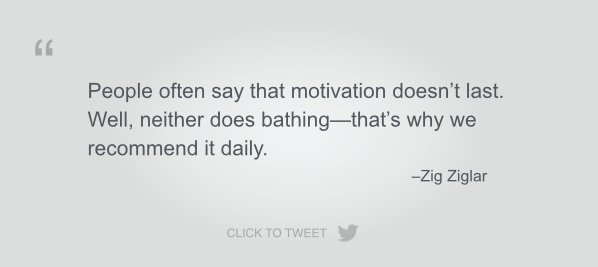[ad_1]
Success is not final. Failure is not fatal. It is the courage to continue that counts. Because when you have no motivation, the simplest task seems like an uphill battle.
You may have some vague goals you want to accomplish, but you don’t feel that push of ambition driving you forward. There are things that used to interest you, but you wouldn’t call them passions.
Or perhaps you know what you want, you even know what you need to do…but you feel stuck. You just don’t feel motivated to keep chasing your goal.
Everyone has times when we feel like our excitement and drive have evaporated into thin air. Fortunately, there is something you can do about it. Below are 21 strategies you can use when you have no motivation to do anything.
1. Use Action to Create Motivation (Not the Other Way Around)

Many people wait until they feel inspired to start working on something or take action. But unfortunately, waiting for lightning to strike can often take a while—years even. The secret that many writers and artists understand is that inspiration often comes AFTER you take action. As artist Henri Matisse said, “Don’t wait for inspiration. It comes while one is working.”
In The 7 Habits of Highly Effective People, Stephen Covey tells a story about love that illustrates a similar point. Covey is counseling a man who is having marital difficulties. The man explains that he doesn’t feel like he loves his wife anymore, and Covey simply says, “Love her.” At first the man is confused. But Covey explains “…Love is a verb. Love—the feeling—is a fruit of love, the verb. So love her. Serve her. Sacrifice. Listen to her. Empathize. Appreciate. Affirm her.” Rather than love being something you simply receive and experience, it is something you take action to create and nourish. The same holds true for motivation and inspiration. How can you take action to create momentum for yourself rather than waiting for lightning to strike?
2. Relish the Process, Not the Outcome
When you are struggling to find motivation, it helps to have a goal in mind. But often, visualizing the desired outcome is not enough. For example, everyone knows about the long-term benefits of exercise, yet that still isn’t enough to motivate many of us to hit the gym.
In the book No Sweat, Dr. Michelle Segar argues that humans are hard-wired to prefer immediate gratification over long-term benefit. So the idea of working out for “health benefits” is too vague and too future-focused. Instead, the key is to learn to enjoy exercise itself—to shift your focus away from those intangible future benefits, and to simply enjoy the experience. This trick can work well with almost any goal or project. Try to find pleasure in the actions you’re taking, without worrying about the long-term goal or what you’re trying to “accomplish.”
3. Shift Your Attention to Benefitting Others
When you are struggling to get motivated, often you are stuck in a “me-focused” rut. You think about what you need to do, or you worry about not knowing what to do next. Then you start to beat yourself up, recalling other things in your life that haven’t gone as planned. Before long, you’re neck-deep in a pity party. One of the best ways to get out of that is to simply focus on other people.
It’s a powerful thing when you realize that, regardless of how down you were feeling, you can still help someone else. On one hand, you realize other people don’t share the critical view you have of yourself (they’re too busy worrying about their own problems). And as it turns out, you can actually help them. It may be as simple as helping a single mother carry her groceries to her car. Or offering to stay late to help another team at work. Seeing how you can add value to other people’s lives with such small effort can help build your confidence. It gets you out of your “me” rut, and reminds you that when you can solve other people’s problems, you never have to wait to be picked.
4. Focus on Little Wins
This is one of the simplest, but most effective motivational strategies. Oftentimes, staring down the barrel of a big goal can be intimidating. Maybe the stakes are high, or maybe you just feel overwhelmed and don’t feel like you can accomplish the goal. To stay motivated in that situation, it helps to find the little “wins” throughout the process. As mountain climbers who’ve tackled Everest recount, they don’t think about getting to the peak of the mountain; they’re just thinking about reaching the next camp. One day at a time, one step at a time. Create smaller milestones for yourself, and do everything you can to celebrate each one as an accomplishment in its own right.
5. Game-ify Your Approach

If you are having trouble continuing toward a goal, often you may be thinking too hard about it. The usual worry-mind takes over, cataloging all the reasons that something could go wrong, why you are not up to the task, or why you are destined to fail. What would happen if you switched your perception? Think to yourself: this isn’t a high-stakes situation (it rarely is), this is a just a game.
When you start looking at a goal or a project as a game, it suddenly takes the pressure off. It also helps do something we talked about a moment ago: focus on little wins. Except instead of feeling pressure to accomplish something, it becomes a fun challenge. Men who are particularly successful at chatting up women often use this psychology: they see it as a numbers game. Each time they go out to talk to women, they know they will “win some and lose some.” But by thinking of it as a game, adding in their own rules and rewards, it helps them relax and enjoy the challenge.
6. Use Artificial Constraints to Stimulate Your Creativity
Often, our motivation is directly related to feeling overwhelmed about the scale of what we’re trying to do. So you might think adding further constraints would hurt, but sometimes it can actually help. For one, constraints help focus you. And by focusing you, they can help relieve stress or worry about how you’re going to attack something.
Let’s say you are stressed about putting together a presentation at work. To make things interesting, you do the first draft of your presentation using only a 4-word headline for each slide (with no other content). That constraint suddenly helps you figure out the high-level flow of your deck without getting bogged down in details. Or, to use another example: at a social gathering, you may decide that you are only allowed to talk to people you’ve never met before. By creating a “rule”, it helps channel your action towards your ultimate goal. But the creative challenge of operating within a constricted framework helps you relax and have fun with it.
7. See Life as a Series of 2-3 Week Experiments
This approach, which I heard from Tim Ferriss, is tremendously useful if you are suffering from a lack of motivation. Why? First, it helps break up a large goal into smaller chunks. But it also transforms your relationship to the process. Now you’re not just thinking about accomplishing a larger goal, you become a scientist whose mission is to gain information and “data” along the way. There are endless ways you can use this in your personal and professional life.
This approach also helps relieve the stress of committing to one course of action. If done well, you can design these small experiments so that you are risk very little if they “fail.” But they are never complete failures if your goal is learning—and especially if they help you validate a particular direction. Often you may feel a lack of motivation because you’re not sold on the right course of action. How could you design a series of experiment that would validate whether you’re headed down the right path? Rather than being paralyzed thinking about what you want to do with the rest of your life, just take action for the next 2-3 weeks.
8. Truly Understand Your Why
Have you noticed how if you deeply desire something, you can summon almost unlimited energy and resources to go after it? If you aren’t feeling motivated to pursue goal, it’s not necessarily a sign that you don’t want to do it. It could just be that you’ve lost touch with your “why.” You’re thinking about the daily grind, and you’ve forgotten the real reason—the ultimate benefit—of why you’re on this path.
It reminds me of the story of the 3 bricklayers who are building a church. When asked what they’re doing, they respond in three different ways. The first one answers gruffly, “I’m laying bricks.” The second one says, “I’m putting up a wall.” And the final bricklayer says, beaming, “I’m building the world’s most beautiful cathedral.” You can bet that the third bricklayer feels far more excited about each brick that he lays, because he appreciates the big picture of what he’s doing. What is your why?

9. Imagine Future Regret to Clarify Your Priorities
Again, one of the things that zaps our motivation is not having a clear focus or vision. Usually it’s because we’re trying to chase down too many things at once. So how do we prioritize? As Greg McKeown explains in his book Essentialism, the word “priority” has become bastardized in modern culture. “The word priority came into the English language in the 1400s. It was singular. It meant the very first or prior thing.” Yet, if you sit in any boardroom and listen to companies talk about their business plans, they inevitably talk about multiple priorities. And as individuals, we’re no different.
The problem is that the more “priorities” we have, the more diluted our focus. Often, because we are prioritizing so many things, NONE of them get done. So how do you separate the must-achieve from the nice-to-achieve? I like technique of imagining my future regret. Whatever the time period—whether it’s a year or a month, or even your lifetime—imagine yourself at the end, and ask yourself what you’d truly regret not accomplishing. When you visualize those moments in the future, it becomes much easier to see the things you truly value. Typically they are the things that we know we MUST do because they are well within our grasp. But they also help us identify things that are nearest and dearest to our personal values and beliefs.
10. Lower Your Expectations
Let’s get real for a second: if you are upset that you feel unmotivated right now, your discomfort is is not because you are unmotivated. Your discomfort is being caused because you are upset about being unmotivated. One of my favorite Shakespeare quotes is “There is nothing good or bad, but thinking makes it so.” Unless we are experiencing physical pain or loss, most of the times we are upset in life it is the idea of the problem that’s bothering us, not the problem itself. In medicine, sometimes it is not the injury that causes the problem, but the body’s reaction to it (inflammation, for example). Often, your own expectations of yourself cause the most pain.
Give yourself a break. Ask yourself, is this really a crisis? Or do I just need to relax and get through it? You might find yourself in a situation where you suddenly lack stimulus in your life—maybe your contract gig has ended, or you just got out of a relationship. Suddenly, that vacuum gives you more time to sit with your thoughts. Maybe you need to get out of your head and just “be” for a little while without judging yourself. Your expectations are too high. If you give yourself a judgement-free zone to not worry about being motivated for a bit, soon enough you’ll come down off the ledge and your focus will shift to something more positive.
11. Embrace Shitty First Drafts
Sometimes the biggest thing that zaps our motivation is fear. We think about what needs to be done, and we’re scared we don’t have what it takes to do a good job. Or we’re scared we don’t have a vision for success. Writers have a trick for overcoming this initial barrier. As Anne Lamott writes in Bird by Bird, you need get comfortable letting go and writing those “shitty first drafts” that lead to clarity and sometimes brilliance in later drafts. Author Shannon Hale puts in a slightly more playful way: “When I’m writing a first draft, I have to remind myself constantly that I’m shoveling sand into a box so later I can build castles.”
This motivational strategy can apply to any field. We look at our goals, projects, our to-do list, and we delay taking action because our first steps aren’t going to be perfect. Well, the key is to doing great work is that sometimes we have to do crappy work first. You can’t tinker with a novel in your head until it’s perfect before putting down the first word on paper. And you can’t wait until all the stars are aligned or you’ve “figured everything out” to take action in other areas of life. Take the leap, put yourself out there. It won’t be perfect, but at least you’ll have started. And before long, that scrappy first draft will be refined and become a thing of awesome beauty.

12. Regularly Refuel With Inspiration
Just like your car, you need regular fuel to keep going, and to keep your head in the game. For many of us, that fuel comes in the form of inspirational stories about other successful people. There is nothing to be ashamed of if you constantly seek out inspiration. At times, you may feel like you are endlessly filling a leaky bucket. But that’s the nature of our inspiration reservoir: it requires constant refilling. Zig Ziglar famously remarked, “People often say that motivation doesn’t last. Well, neither does bathing—that’s why we recommend it daily.”
Find the people and the things that inspire you—the ones that literally breathe life into you and help you recharge. Make a habit of getting your daily or weekly dose of that inspiration. It may be meeting a friend for coffee, or listening to a podcast, or reading blogs and books. Whatever it is, recognize the things and people who help keep you inspired and soak up all that you can.
13. Organize Your Space Like a Kindergarten Classroom
When you’re feeling unmotivated, that doesn’t mean you should turn all of your energy towards your goal. In fact, maybe the problem is that you’re spending too much energy on it. Maybe you’d be better off creating smaller periods of extreme focus, and then giving yourself time to NOT focus. Your environment has a lot to do with this.
Years ago, I read a book on “How to Get Organized,” and it talked about how a kindergarten classroom is a perfect example of organization because it’s laid out for specific tasks: the finger painting station in one corner, the storytime circle in the middle, the block station in another corner, etc. Steal this approach for your home or work environment. Carve out a specific place where you focus on whatever it is you’re trying to achieve. Then give yourself specific areas where you can just relax. It can be extremely demotivating when you feel like you are always “on.” If you can focus your efforts within a specific place, you start to build up an association with that area—it becomes “a place where stuff gets done.” And having a place where stuff doesn’t need to get done can be equally helpful in rekindling your motivation.
14. Build in Accountability to Raise the Stakes
Sometimes you lack motivation when the stakes are unclear. All of your choices seem equal, so you might start down one path, lose your stamina, and then start considering another path. You think, “Ugh, I can’t stick with anything!” This happens to everyone when they only rely on internal motivation. The obvious answer is that you need external motivation—something or someone outside of yourself that raises the stakes.
The most common example is having a workout partner. Simply knowing there is someone else showing up on Tuesday morning at 5:30AM to pump iron with you—who will give you endless grief if you bail—is enough to keep you on track. But you can find people or groups that create accountability in almost any sphere.
Get a partner, join a mastermind group. Find people who are on a similar journey as you. They will be your cheerleaders, and they will call you out when you flake. Or if nothing else, raise the stakes by making a public declaration about what you intend to do on social media. A lot of people also benefit from having a coach. You might think your coach needs to be a subject-matter expert. But often, the greatest benefit of a coach is having a paid helper to hold you accountable to your goals.
15. Don’t Just Small-ify Your Goals, Weird-ify Them
As I mentioned earlier, celebrating small wins is extremely helpful for staying motivated. To do that, you need to break your goals down into smaller chunks—to “small-ify” them. But another helpful approach is to set unique or bizarre goals that are parallel to your core goals. In a recent interview, Olympic medalist snowboarder Shaun White said he always gives himself quirky goals to have fun and stay motivated.
In his first Olympics, one of goals was to win the Olympics (duh). But his second goal was to see how many cars he could win. Apparently, car companies were giving out a ton of free cars around the events, and he thought this side motivation might make things interesting. Then, in the Vancouver Olympics, his goals were to (1) win the Olympics, and (2) to be able to wear some American-flag pants. He had seen Axl Rose wearing a similar pair and thought they were cool. He thought “If I won, maybe I can get on the cover of Rolling Stone or something like that…” Sure enough, that’s what he did. “But that’s the fun…it takes a lot of the pressure off. Winning the Olympics is a very big goal…So it’s nice to have something else to offset it.” Obviously, your weird goal may not be to win cars or wear stars-and-stripes pants on the cover of Rolling Stone. But how else might you use that strategy to take the edge off your goals and have some fun? The possibilities are endless.
16. Use Journaling to Break Through Mental Cobwebs
Regular journaling can be a tremendous help towards mental clarity and restoking your motivation. Simply writing down your thoughts, stream of consciousness, helps you feel calmer and more focused. As you journal, you’ll notice the stray thoughts that typically float around your head taking up “mental RAM” without you realizing it. Sometimes it might be your mind pouring over a big goal you haven’t started. Or it could be your mental to-do list gnawing away at your subconscious in the background. Another thing that takes up a disproportionate amount of mental energy is unfinished projects. Somehow, projects that are started but not finished take up more space in the back of your mind.
Don’t worry if you feel like you have nothing to say or to write, just write. Even if you start by writing “I don’t even know what to write. I’m writing some stuff down in a journal to empty my mind….” a funny things happens. Your brain gets bored with your “hollow” writing, and pretty soon it gives you some real things to write about. You might start to recognize a real thing you’re worried about or a topic that’s been occupying your thoughts. After you get that stuff down on paper, and if you can make it a regular thing, you’ll find a certain lightness that will clarify your focus, and make you feel more motivated.

17. Visualize Your Progress (and Your Plan)
One of the big parts of staying motivated is having momentum. Starting a locomotive on the tracks takes a tremendous amount of energy and power, but once it’s rolling it requires far less energy to keep moving. If you always feel like you’re having to restart your train—or worse, constantly jumping from one train track to the next—it’s no wonder you feel demotivated. You don’t have a sense of progress.
One way you can help experience a sense of momentum is to visualize your plan and your progress. It doesn’t have to be complicated. It could be just a series of steps on a whiteboard, or a bunch of post-its on your wall. To visualize his daily habit of writing jokes, Jerry Seinfeld famously used a calendar and a magic marker. He knew that writing jokes every day would make him a better comedian. So his system was simple: every day he would write a joke, and mark a red “X” down on his calendar. By doing this, he created a visual “chain” that he could see on his wall. His singular goal? To not break the chain. How could represent your plan in a visual way so you literally see the progress you make?
18. Recognize Opportunities to “Up-Cycle”
I once went to an artisan fair on Treasure Island near San Francisco, and I came across a man was selling beautiful leather wallets. We started chatting, and I found out he made all of his wallets from leftover upholstery scraps. He had found a furniture maker that gave him these beautiful—but sometimes odd-shaped—scraps of leather either for free or for next to nothing. This concept, which I later learned was called “upcycling,” blew my mind.
Sometimes we forget that with every experience we have, there are scraps of raw material and learnings that we gain along the way. And even though they are usually tangential to our main journey, they can be valuable if we know how to make use of them. At first you might be dreading attacking a project or a goal, but if you can recognize the side-benefits—scraps of knowledge or skills that you can use later—it may reinvigorate your interest and excitement about the path you need to take. This can be a particularly good strategy cultivating resilience in your day job.
19. Fake it: Pretend to Be a More Motivated Person
If you’re not feeling motivated, one reason is that you’re not acting like a motivated person. You might be thinking: How can I act motivated if I don’t feel motivated? Well, as I mentioned earlier, inspiration and motivation often come AFTER you take action, not before. And sometimes getting motivated doesn’t even require taking specific action towards your goal—it simply involves pretending you’re a motivated and confident person.
As I’ve written about before, Harvard psychologist Amy Cuddy has a fabulous Ted Talk about the benefits of this “fake it ‘til you become it” strategy. Studies showed that when participants did a series of “power poses,” they created real chemical changes in their bodies, increasing the amount of testosterone and decreasing cortisol (a stress hormone). By simply acting more confident and bold, their bodies responded chemically to give them the strength and energy to actually be that way.
So if you aren’t feeling motivated, it may be as simple as asking yourself “What would a motivated person do? How would a motivated person act and talk?” Go through the motions, and you may begin to feel real changes in your motivation and confidence.
20. Just Get Your Body Moving
Closely related to the “fake it till you become it” approach is the tried-and-true solution: physical movement. Maybe you don’t need to “get into the mind” of being a motivated person. Maybe you just need to move your limbs. When you are feeling lethargic, depressed or de-motivated, getting your body moving can do wonders. You don’t need to run 20 miles or bench press a monster truck tire. Sometimes it’s as simple as taking a brisk walk outside and getting some fresh air.
Exercise gets your blood moving, helps eliminate toxins from your body, helps reduce stress, and increases your ability to think more clearly. But you knew that already…
21. Get Out of the Building
It’s easy to feel unmotivated if you’ve been thinking about one thing for too long. Maybe you’re holed up in your office or in your house, and all you can think about is some big goal you need to accomplish—or a project you don’t want to start. The answer is simple: you need some perspective. As startup guru and Stanford professor Steve Blank often told his students, you need to “get out of the building.” He would see his entrepreneurship students struggling to come up with ideas or running into problems with their projects. Steve would remind them that they were spending too much time tweaking their ideas in a vacuum. What they needed was to get out and talk to real customers to get some perspective.
“Getting out of the building” is beneficial for a couple reasons. First, receiving outside input or information from the real-world often gives you valuable insight, as in the case of Steve Blanks’ students. But the biggest benefit is that it serves as a “pattern-interrupt” for your spiraling thoughts. If you’re feeling stuck, you probably are. So why not get out of your current situation—physically and mentally—and see things from a different perspective. Sometimes that simple shift can make all the difference to rekindling your motivation.
Conclusion
Even if you feel like you have zero motivation right now, don’t beat yourself up. Everyone gets into a rut now and then. We’ve all experienced that feeling of having an empty tank, with no sign of change in sight.
The important thing to realize is that (A) you’ll survive and get through it, and (B) there are things you can do to improve your situation. I sincerely believe that if you try using the tips above, you can create positive changes in your life—and even become a man others look up.
If all else fails, don’t be afraid to ask for help. Find a therapist, talk to your doctor, talk to a friend. You don’t have to walk this path alone.
[ad_2]




